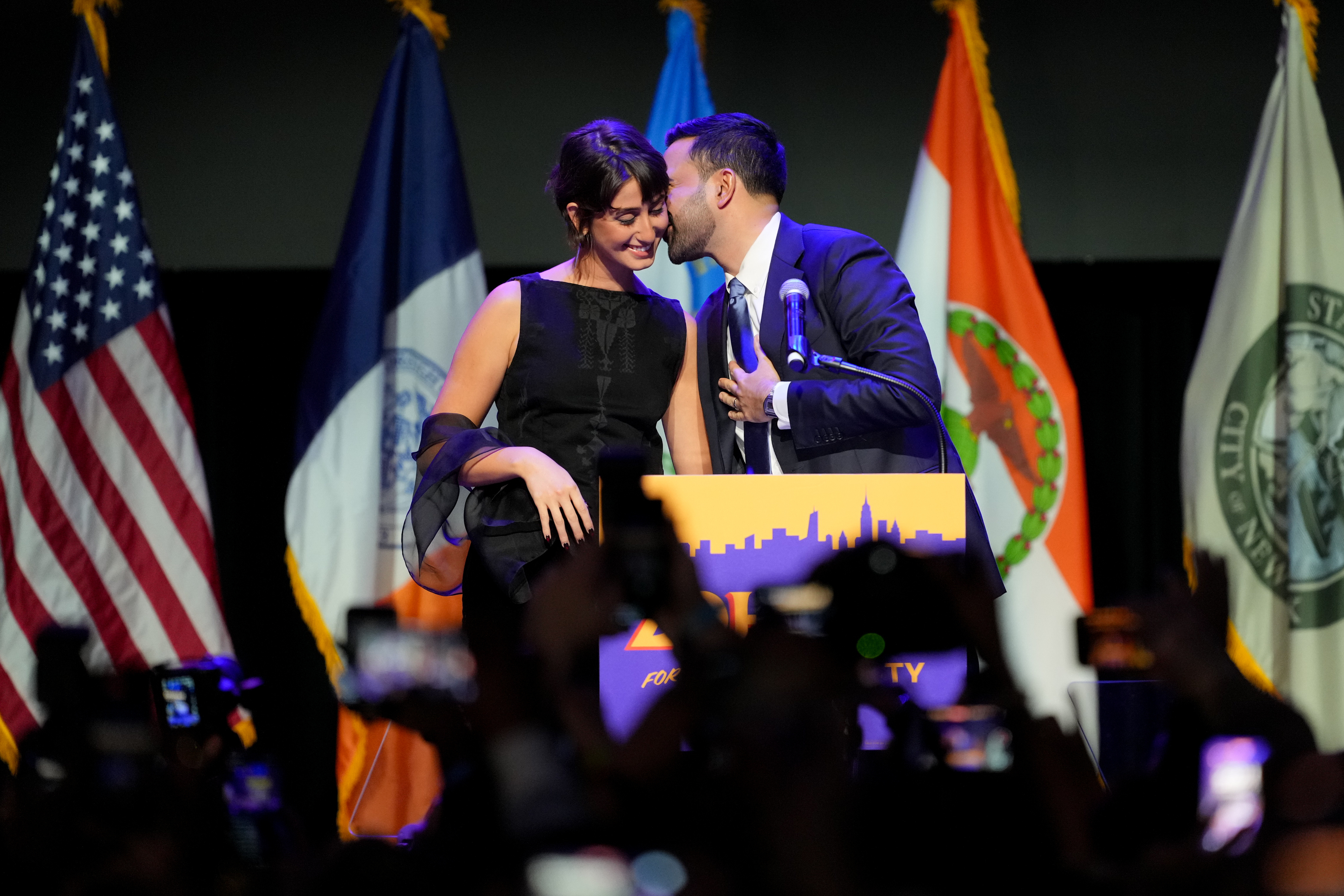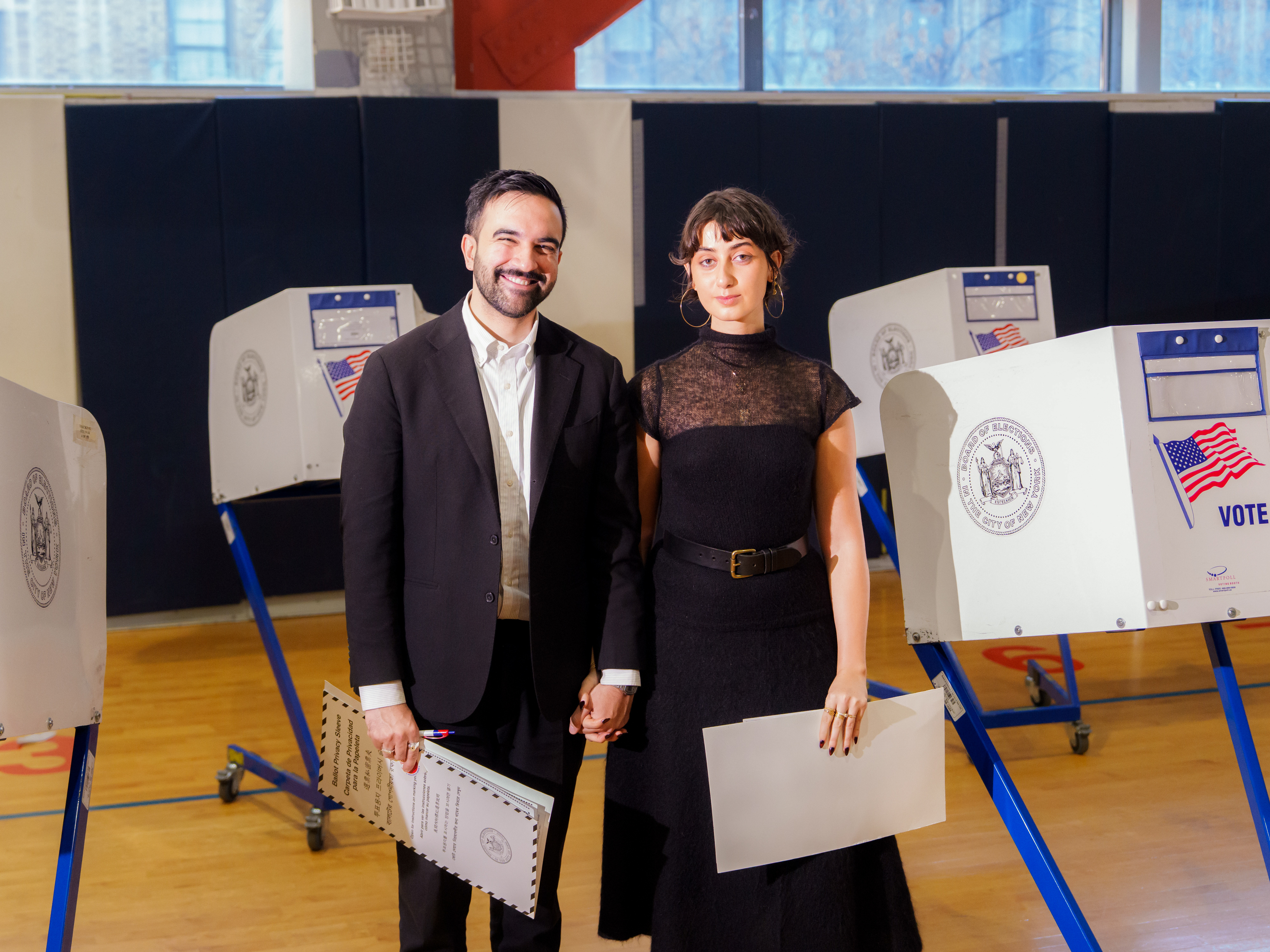“My friends, we have toppled a political dynasty,” said Zohran Mamdani on Tuesday evening, after being elected mayor of New York City.
Mamdani enjoyed a resounding victory after running an “impressive campaign” (to borrow former President Barack Obama’s phrase) that earned him the Democratic nomination earlier this year. At 34, Mamdani is the youngest mayor in a century—a Millennial two generations younger than his opponents, Republican nominee Curtis Sliwa, 71, and former New York governor Andrew Cuomo, 67, a Democrat who ran as an independent. (Cuomo resigned from his former post in 2021 following sexual misconduct allegations.)
It's an image that will go down in New York City history: mayor-elect Zohran Mamdani and Rama Duwaji, his wife, waving to cameras at the conclusion of his November 4 victory speech. The Democratic Socialist is the youngest candidate in a century to lead the biggest city in the United States, and the first Muslim to hold the position, beating former governor Andrew Cuomo and Curtis Sliwa in a race that captured nationwide attention.
"[O]ver the last 12 months, you have dared to reach for something greater," Mamdani told the crowd gathered at his Brooklyn victory party (and everyone else watching from afar). "Tonight, against all odds, we have grasped it. The future is in our hands. My friends, we have toppled a political dynasty."
By his side, Duwaji didn't make public remarks of her own. However, what she chose to wear for her first appearance as the incoming first lady spoke volumes.
It's an image that will go down in New York City history: mayor-elect Zohran Mamdani and Rama Duwaji, his wife, waving to cameras at the conclusion of his November 4 victory speech. The Democratic Socialist is the youngest candidate in a century to lead the biggest city in the United States, and the first Muslim to hold the position, beating former governor Andrew Cuomo and Curtis Sliwa in a race that captured nationwide attention.
"[O]ver the last 12 months, you have dared to reach for something greater," Mamdani told the crowd gathered at his Brooklyn victory party (and everyone else watching from afar). "Tonight, against all odds, we have grasped it. The future is in our hands. My friends, we have toppled a political dynasty."
By his side, Duwaji didn't make public remarks of her own. However, what she chose to wear for her first appearance as the incoming first lady spoke volumes.
Duwaji appeared on stage in a square-neck, laser-cut denim top from Zeid Hijazi, a Palestinian-Jordanian designer based in London. According to Hijazi's website, his pieces blend his Palestinian heritage with "Middle Eastern craftsmanship [and] couture elements." Duwaji layered the piece over a black skirt by New York Fashion Week regular Ulla Johnson, and added earrings by jeweler Eddie Borgo.
Even without knowing the brands behind them, Duwaji's outfit reads like an atypical choice for a politician's spouse: Think of a first lady, and your mind will likely go to Jackie Kennedy-esque skirt suits or the J.Crew sweaters of Michelle Obama's era at the White House. Even if the person getting dressed doesn't identify as a conservative politically, their clothing tends to read more modest than modern. Duwaji's, by contrast, look copied and pasted from the streets of Brooklyn, where she works as an artist and illustrator.

Duwaji and Mamdani onstage on election night.
Dialing into the specific designers reveals Duwaji's understanding of the spotlight she now occupies as New York City's inaugural Gen Z first lady. Ulla Johnson and Eddie Borgo are both based in the city Mamdani is set to lead; wearing local designers is Duwaji's way of supporting the local fashion community, who are now a segment of her husband's constituents. (Given the 28-year-old's attendance at Rachel Scott's Diotima show in September, an affinity for NYC-based brands isn't necessarily a surprise.)
Her top by Zeid Hijazi, meanwhile, alludes to her passions as an artist and her personal convictions. Duwaji, who is of Syrian descent, often uses her work to explore the lives of Middle Eastern women; in recent years, her art has focused on Palestinian women in Gaza. “With so many people being pushed out and silenced by fear, all I can do is use my voice to speak out about what’s happening in the US and Palestine and Syria as much as I can,” Duwaji said in an interview with Yung, an arts magazine.
The Mamdani campaign faced intense pressure for his views on the war in Gaza. The mayor-elect was also subject to Islamophobic attacks on his religion and heritage. Wearing a designer of Palestinian descent on election night allowed Duwaji to reaffirm her views while backing her husband's.

Mamdani and Duwaji at the polls on November 4.
Back in May, Mamdani shared a message about his wife alongside photos of their wedding ceremony on Instagram. “Rama isn’t just my wife, she’s an incredible artist who deserves to be known on her own terms,” he wrote.
In her official introduction as the incoming first lady of New York City, Duwaji made clear she's bringing her entire identity into the position.



0 comments